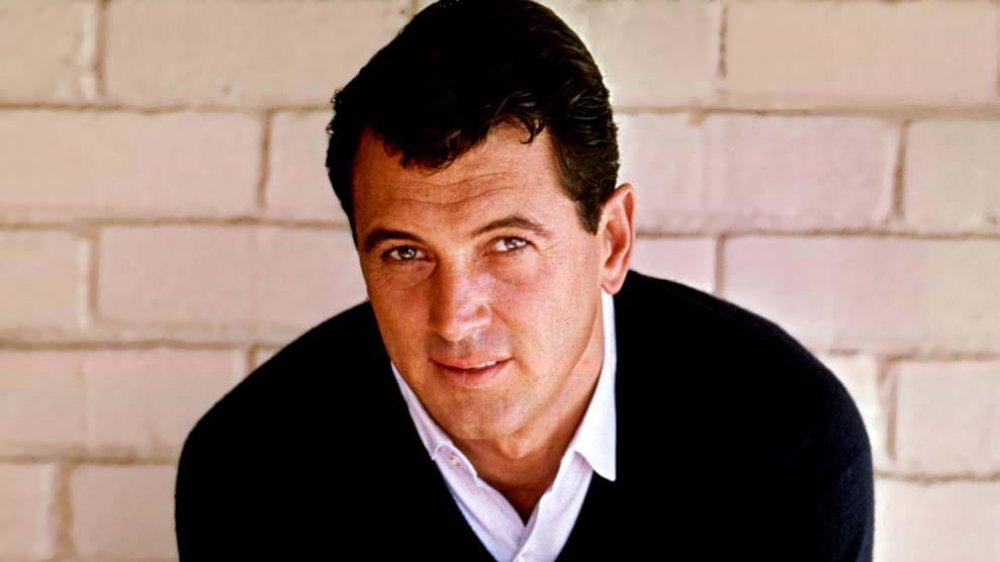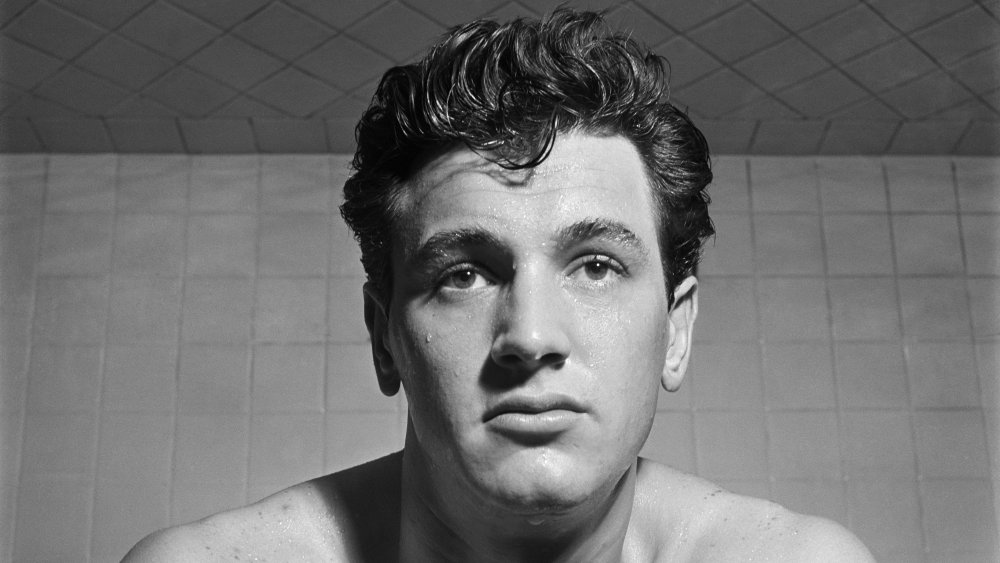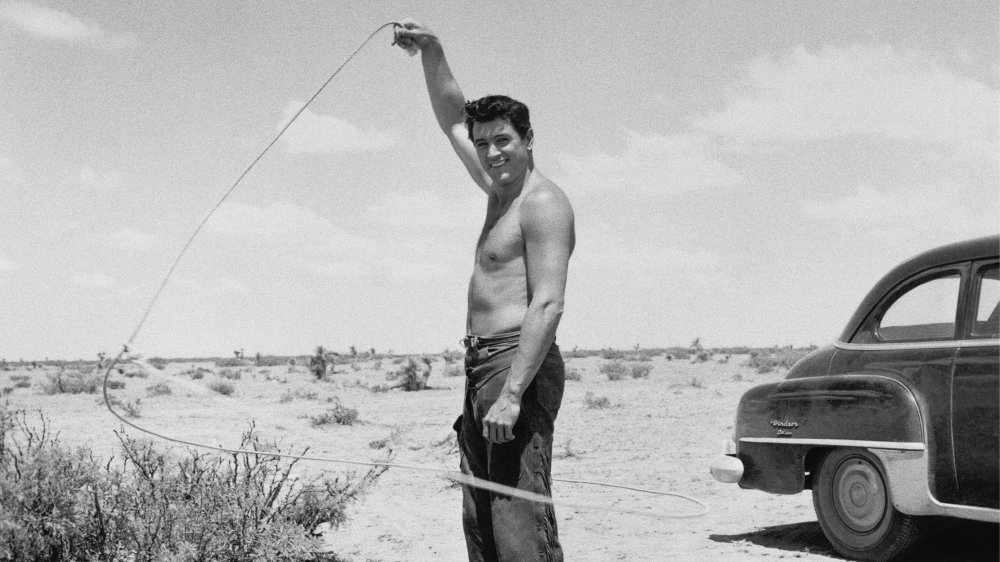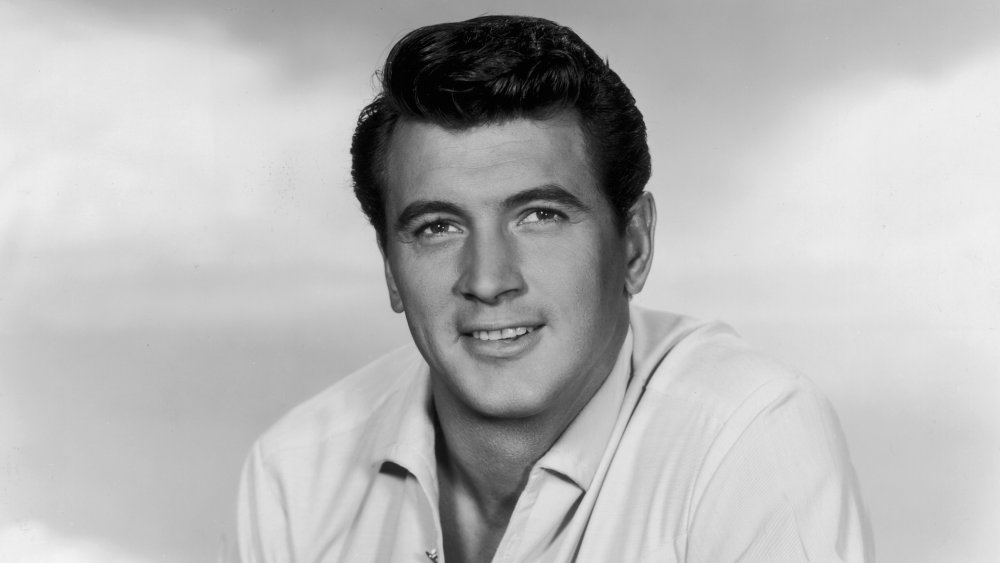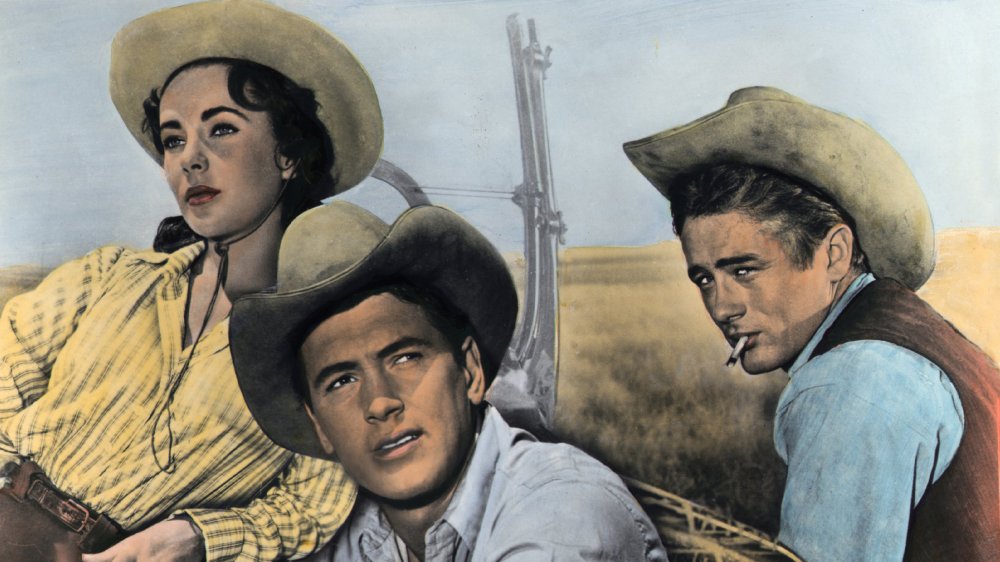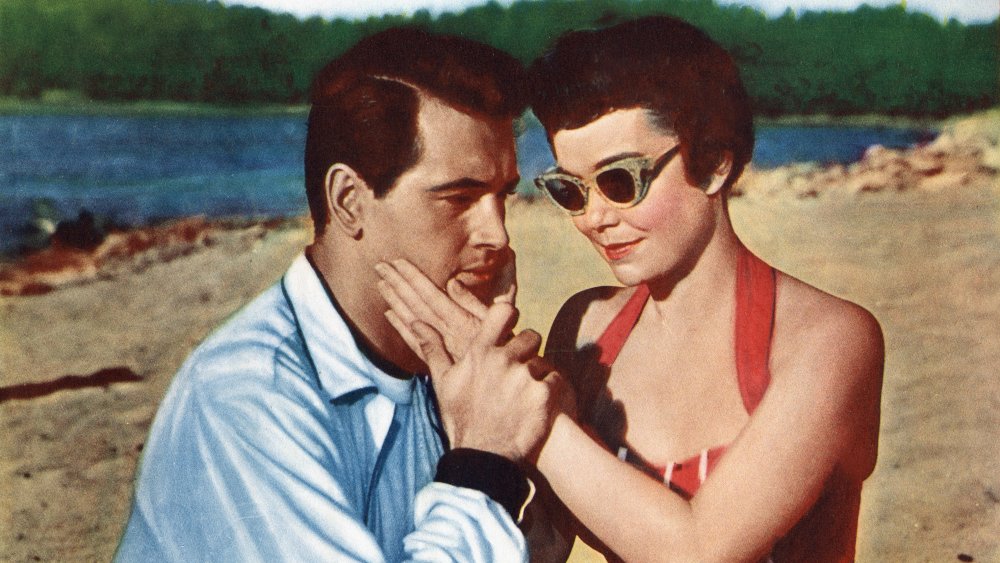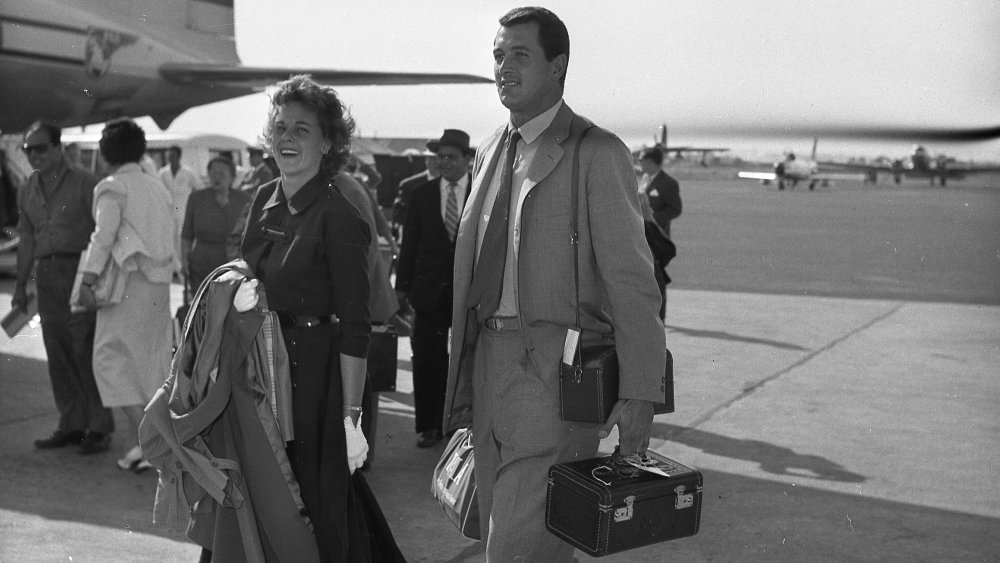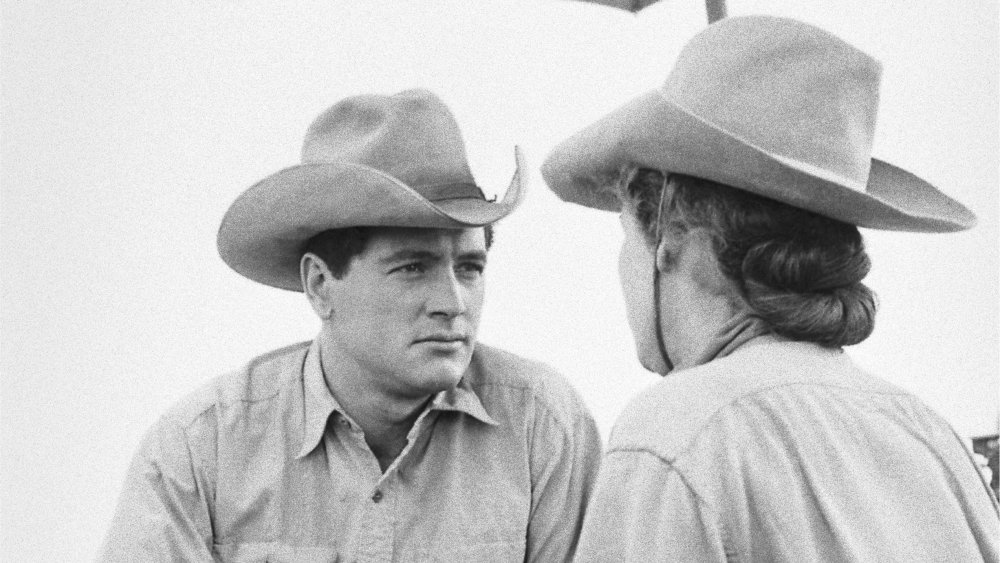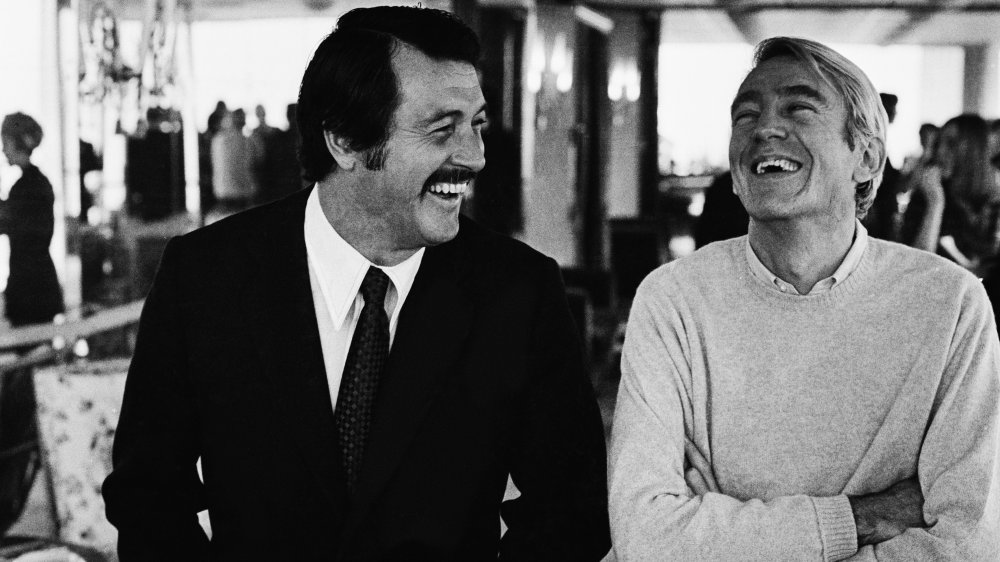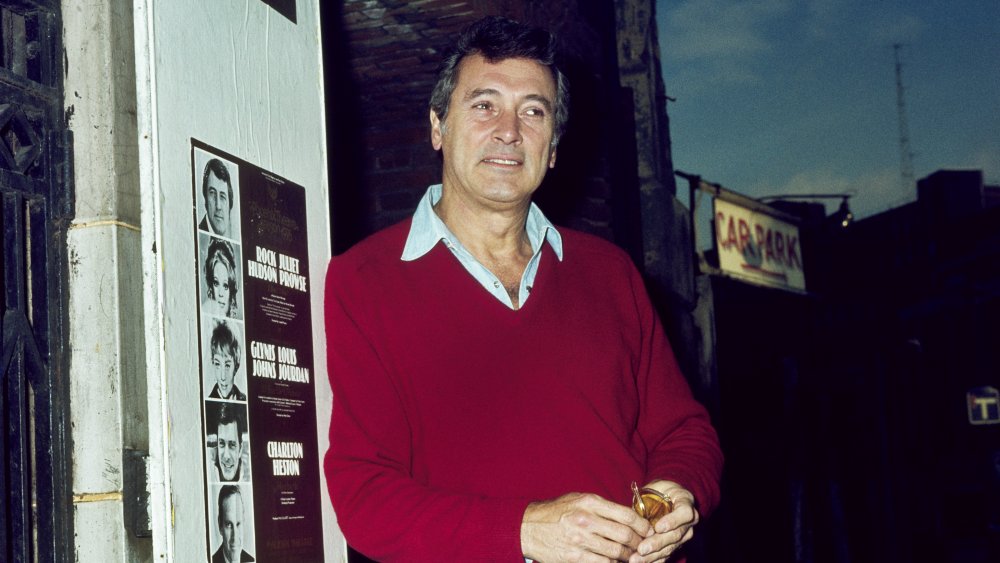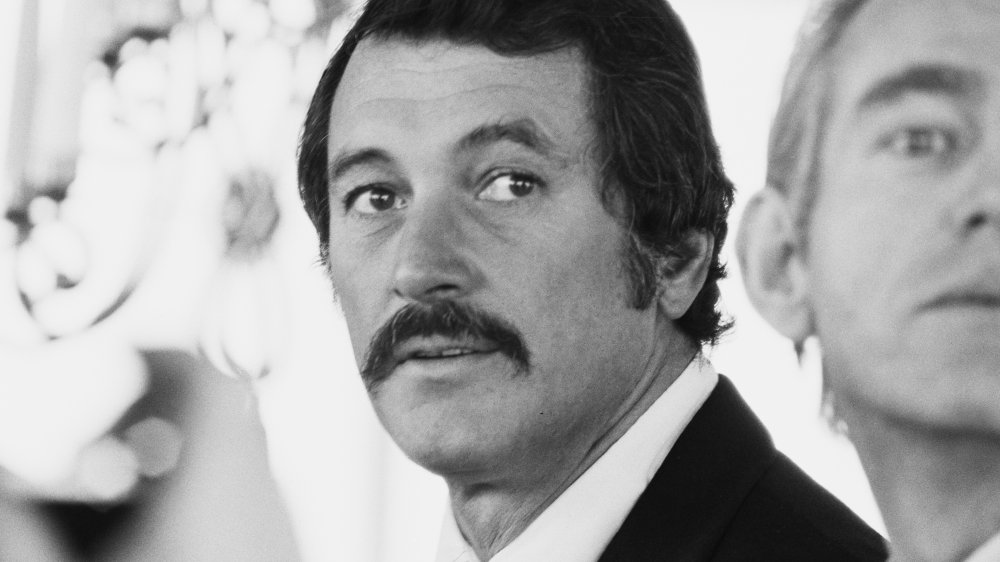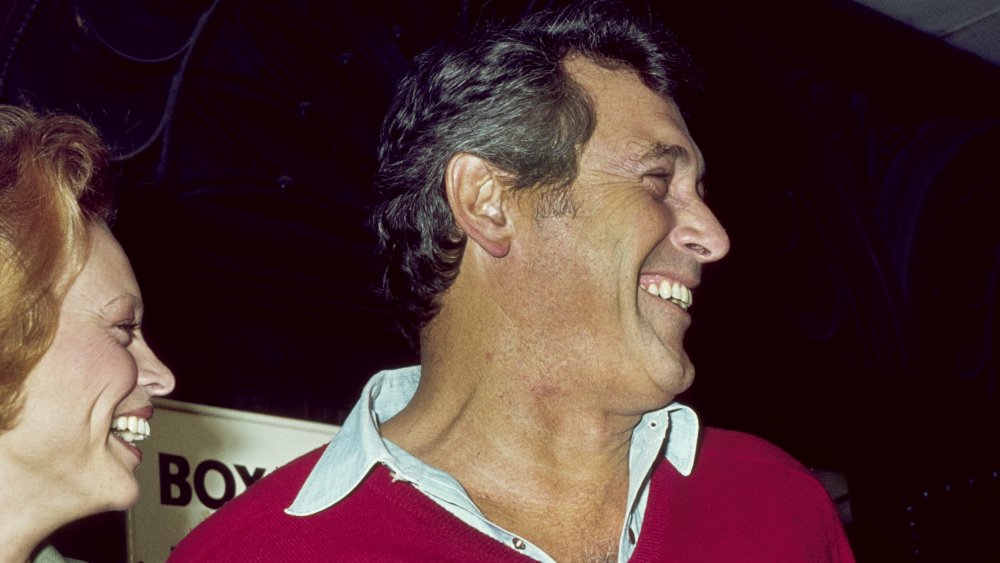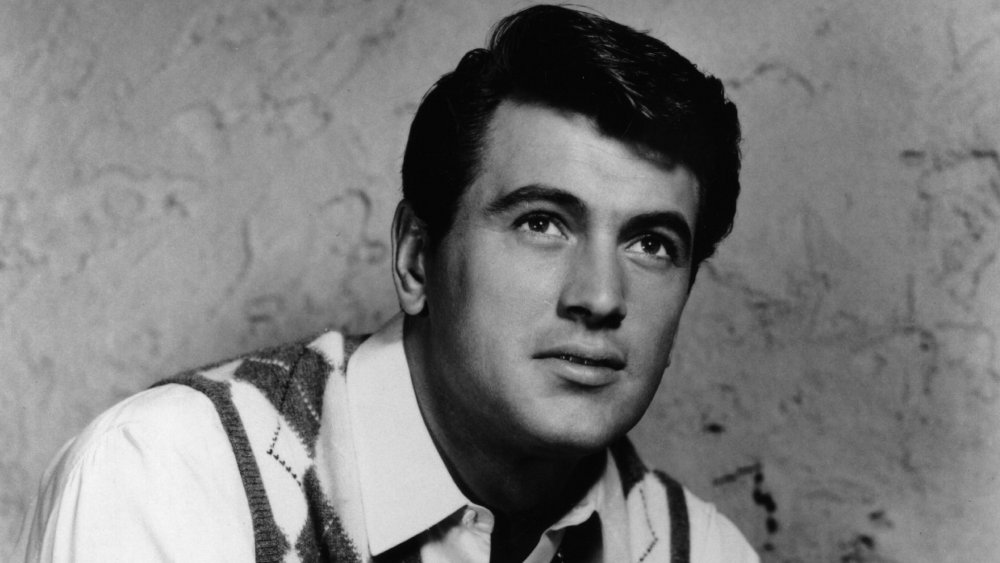The Tragic Real-Life Story Of Rock Hudson
Rock Hudson was one of the illustrious actors of the Golden Age of Hollywood, best known for cinematic dramas such Giant and All That Heaven Allows and screwball romantic comedies like Pillow Talk and Lover Come Back. To his fans, Hudson was the pinnacle of machismo and rugged masculinity. Men admired him, and women adored him. While we still remember Rock Hudson as a great classic actor, we also realize just how perfectly tailored Hudson's image had been when he was one of Hollywood's greatest stars. Underneath the rough and tough ladies man image, Hudson constantly had to hide who he really was — deeply wounded, highly sensitive, and gay.
In Netflix's recent series, Hollywood, we get a glimpse of the brutality Hudson suffered during his time as a star — being abused by his agent, changing his image, and playing to the public's idea of a manly, straight male. However, the series gives Hudson a much nicer ending: dramatically firing his cruel agent, embracing a relationship with another man, and playing a gay man on film. We all know this never happened; being openly gay in Old Hollywood might have killed Hudson's career. It was nice to give Hudson a happy ending, but the history of Hudson's life was far more complicated and heartbreaking. This is the tragic real-life story of Rock Hudson.
Rock Hudson had a troubled childhood
Rock Hudson didn't have the easiest start in life. Born Roy Harold Scherer, Jr. in Winnetka, Illinois, Hudson's father abandoned him and his mother when Hudson was still a child. His mother later remarried a man named Wallace Fitzgerald. Hudson's new stepfather adopted the eight-year-old Roy, giving him the last name Fitzgerald. One would think it would be indicative of some paternal feeling towards the boy. However, this turned out not to be the case. According to USA Today, Wallace Fitzgerald was brutal towards his stepson, especially when the young Roy first revealed his interest in becoming an actor. Hudson learned early in life just how dangerous it could be to express his true thoughts and feelings.
According to Biography, Hudson later enlisted in the U.S. Navy during World War II and served from 1944 to 1946. After he was discharged, he moved to Hollywood and took a paying job as a truck driver. He lingered around movie studios during the day, hoping to be noticed by executives or talent agents.
Rock Hudson may have been preyed upon by an agent
The young Roy Fitzgerald (as Rock Hudson was then known) did get his wish and was discovered by Hollywood talent agent, Henry Willson. According to the Radio Times, Willson was quite taken with Roy's dashing good looks and imposing 6'4" height. However, the talent agent had a very shady reputation in the Hollywood world. It was a semi-open secret that Henry Willson was gay; he was out as much as one could be in the Old Hollywood world. And while he was good at producing actors, it was also known that Willson usually recruited young, handsome, and inexperienced aspiring actors. And those clients were generally expected to do "favors" for Willson — including Hudson. Rock Hudson's recent biographer, Mark Griffin, confirmed these rumors in an NPR interview. "It was fairly well-known that if you were a Henry Willson client, as Tony Curtis once expressed it, you probably had to sexually express yourself to Henry," Griffin said.
Rock Hudson and Henry Willson actually had a lot in common, as noted by Harpers Bazaar. Both were gay men with abusive fathers; Willson's father sent him to an all-male boarding school when he was young, hoping the school would rid his son of any "feminine" tendencies and make him more "manly." It has been suggested that Willson's time in boarding school allowed him to hone his skills in procuring masculine men for Hollywood.
Rock Hudson completely remade himself
Once Willson recruited him, Roy Fitzgerald had to completely remake his image. With Henry Willson's help, of course. According to Biography, Willson was actually the one who gave his client his new name, Rock Hudson — "Rock" for the Rock of Gibraltar and "Hudson" for the Hudson River. Given that Hudson's legal last name up until that point had been his abusive stepfather's, he probably wasn't too regretful about giving it up. But Willson knew that Hudson needed more than a name change to be a convincing leading man. It was clear that Hudson was gay, but that couldn't be made obvious to studio executives or the public. Luckily Hudson already had the height, the good looks, and the naiveté. Willson could work with all of that.
According to Vanity Fair, Willson personally paid for an extensive makeover for Hudson. This included getting Hudson's teeth capped, buying him a new wardrobe, and sending him for vocal lessons. Willson even trained Hudson out of any effeminate mannerisms and taught him to exude excessive masculinity. In essence, Henry Willson can be credited with creating the cinematic image of the Rock Hudson the public recognized.
Rock Hudson wasn't a great actor in the beginning
Surprisingly enough, Rock Hudson was actually not that great an actor in the beginning. He had no professional experience or training as an actor when he first arrived in Hollywood. However, others were willing to take a chance on him because of his stunning, all-American good looks and imposing height. According to Harpers Bazaar, before signing with Henry Willson, Hudson would apparently pose outside of the studio gates hoping to catch a higher-up's attention with his comeliness or send photos of himself to producers. Even his agent, Henry Willson, couldn't deny that Hudson's primary talents — in the beginning — were his striking good looks. According to Vanity Fair, after laying eyes on Hudson, Willson was said to have declared, "The acting can be added later!"
Once Hudson was signed, he was given acting and vocal lessons. His debut role in 1948 was a bit part in the movie Fighter Squadron. However, as noted by The Radio Times, there were rumors that it took 38 takes for Hudson to deliver his one simple line in the film successfully. In fact, for the rest of his acting career, Hudson was notorious for his problems with learning his lines. Despite his struggles, they didn't stop him from starring in the 1956 film Giant alongside Elizabeth Taylor and James Dean — a role that earned him a Best Actor Oscar nomination.
Rock Hudson's roles often imitated life
Homosexuality was never portrayed on the big screen during the Old Hollywood days, but many of Hudson's roles often depicted a man in the midst of an identity crisis (i.e., Magnificent Obsession, All That Heaven Allows). According to USA Today, one of Hudson's regular directors, Douglas Sirk, seemed keenly aware of Hudson's personal struggles with identity (and was well aware that Hudson was gay) and likely urged him to do these roles. Given how Hudson grappled with pretending to be a completely different person to his public in real life, he was most effective in these film roles.
Douglas Sirk and Rock Hudson worked together several times, and they both had a close friendship. According to an article in The Criterion Collection, Hudson described his bond with Sirk as very much a father-son type of relationship. "He was like ol' Dad to me, and I was like a son to him, I think," Hudson said, per Criterion. "When you're scared and new, and you're trying to figure out this thing, and suddenly an older man will reach out and say, 'There, there, it's okay,' that was Douglas Sirk."
Hudson was about the same age as Sirk's son, whom he lost custody to in a divorce after his ex-wife joined the Nazi Party. And Hudson had never had a close paternal figure in his life, so Sirk was certainly a welcome change.
Rock Hudson probably had an arranged marriage
Within the confines of the Hollywood world, it was tacitly acknowledged that Hudson was gay. But the public didn't know it. Hudson was still unmarried at the age of 29, and his fans were puzzled as to how this suave, charismatic man from the silver screen could still be a bachelor. According to Harpers Bazaar, when questioned about his marital status, Hudson always tried to brush off the inquiries, jokingly calling himself "marriage shy." But the rumor mill was starting to churn, and Hudson's agent, Henry Willson, knew that if they didn't act soon, Hudson would be publicly exposed as a gay man. There was only one way to quiet the tabloids, and there was no other way around it. Hudson had to get married.
In 1955, Rock Hudson wed Phyllis Gates — who just so happened to be Henry Willson's personal secretary. It's highly speculated that this was an arranged marriage that Willson orchestrated. The marriage didn't last long. Gates and Hudson divorced after three years. Gates later wrote a book about her relationship with Hudson, citing him as abusive and claimed that she had been duped into marrying him. Given that Gates was Willson's own secretary, most find it hard to believe that she was completely in the dark about Hudson's sexual orientation — especially given the relationship Hudson had with her boss. After their divorce, Hudson never married again.
Hudson had to fire his agent
Although Henry Willson was instrumental in starting Hudson's career, working with him came at a hefty price. According to The Radio Times, Willson's reputation had never been the greatest, but by the 1960s, it was getting even worse. Besides being a notorious alcoholic, excessively vicious and cruel, rumors of Wilson's "gay casting couch" were circulating. Studios became increasingly more reluctant to sign his clients. Hudson stood by Willson and continued to have a professional and personal relationship with him for years, but by 1966, Willson was becoming a weight around his neck. Hudson fired him.
Hudson had been Willson's most profitable client, and without him, Willson didn't have much to work with. He would continue to spiral downward into poverty and ill health. According to Vanity Fair, when his health was so poor, and the money had run out, Willson begged Hudson for financial help. Hudson wrote a check for $20,000 and said that was all he owed Henry Willson and no more. Willson died in 1978 of cirrhosis of the liver. By then, he was completely destitute. There wasn't even enough money for a headstone at his grave. For years, Henry Willson was nameless in his plot until someone finally paid for a headstone to be made.
Rock Hudson had numerous health issues
Prior to his diagnosis with AIDS, Rock Hudson was already starting to develop severe health problems in the early '80s. According to Good Housekeeping, he was a heavy smoker and drinker, which were likely the main contributors to his issues. As noted by TCM, in the 1980s, Hudson had switched gears and was now acting on television. In 1982, when starring on the short-lived detective show, The Devlin Connection, he had a massive heart attack that shut down production, and Hudson had to have quintuple bypass surgery. By the time Hudson recovered from surgery and filming resumed, viewers lost interest in The Devlin Connection, and the show was canceled.
Rock Hudson's last major role was on the soap opera, Dynasty. He was intended to be a leading character, but soon it became obvious that his health was failing him. Hudson was becoming increasingly frailer, losing weight, and soon his speech began to suffer. After 14 episodes of Dynasty, Hudson's character had to be written off the show.
Rock Hudson hated interviews
As an A-list Hollywood star, Rock Hudson would always be in the public eye, but he tried to avoid the limelight whenever possible, including interviews. In one of his rare interviews in the '80s with journalist Randa Handler, Handler inquired about his reluctance to give interviews. Hudson responded by blaming his interview-shyness on worries about being misquoted.
"I have been misquoted so many times over 40 years that I get uptight at the idea of yet another interview. I worry about what would be printed. I enjoy playing the game with the press of how my answers are interpreted."
While there is certainly some truth to his answer, most likely, Rock Hudson found interviews particularly stressful due to diminished control. For decades, he had to play a very specific, carefully crafted role for the public, and a curveball question from an interviewer could throw off the facade — which meant he risked exposure.
Rock Hudson anonymously contacted lovers after his AIDS diagnosis
Rock Hudson was diagnosed with AIDS in 1984. According to Harpers Bazaar, Hudson had originally visited a dermatologist to have a blemish on his neck examined. The blemish turned out to be Kaposi sarcoma, a form of cancer typically found in AIDS patients. This meant he had an obligation to contact his recent former lovers to inform them of his illness. However, Hudson was still wary about exposing his identity and outing himself as gay. Instead, his close friend, George Nader, handled the process for him by sending out anonymous letters, which, according to USA Today, stated the following: "We recently had sex together, and I have been informed by my doctor that I may have AIDS. Please go to your doctor and have a check-up."
Nadler posted the letters from his home in Palm Springs to prevent anyone from tracing them back to Hudson and compromising him. Despite their best efforts to protect Hudson, one of the recipients, a 22-year-old man, guessed the letter writer's actual identity. After being diagnosed with AIDS himself, the young man sold his story to a tabloid for $10,000 before dying six months later.
Rock Hudson became the face of the AIDS epidemic
Eventually, according to Harpers Bazaar, Hudson came out publicly in 1985 about his AIDS diagnosis and identity as a gay man. He was one of the first celebrities to discuss his homosexuality and his diagnosis with the deadly disease. It ended up being a huge turning point in bringing greater awareness about the AIDS epidemic. Before, AIDS was publicly dismissed as a "gay disease" and not regarded as seriously as it needed to be. But once Rock Hudson came out, everything changed. Now there was an identifiable human face for the disease. It can be considered disappointing that it took a celebrity getting diagnosed with AIDS — a sickness that was already killing many — in order for it to be given proper attention, but it did the trick.
Hudson's old celebrity friends like Elizabeth Taylor and Doris Day stood by him. The public was sitting up and paying attention. People were coming out and supporting AIDS benefits and fundraisers. In a 1985 interview with People, Joan Rivers admitted that Rock Hudson's coming out did wonders for AIDS support. "Two years ago, when I hosted a benefit for AIDS, I couldn't get one major star to turn out. ... Rock's admission is a horrendous way to bring AIDS to the attention of the American public, but by doing so, Rock, in his life, has helped millions in the process. What Rock has done takes true courage."
Rock Hudson couldn't be with his true love
Rock Hudson passed away at the age of 59 on October 2, 1985. He was able to live out the remainder of his life surrounded by close friends. While Hudson was fortunate to have a support system at the end of his life, he never was able to have true love. His career and public life wouldn't permit it. According to People, Before his death, Hudson revealed to biographer Sara Davidson that stockbroker Lee Garlington was his real "true love." The two dated in the mid-60s but had to keep their relationship a secret or it would have meant career suicide for both of them. This involved taking secret trips together away from the press's prying eyes and attending Hollywood events together with women as their official dates. But Hudson's career in the public eye wouldn't allow them to stay together for the long haul.
Now in his 80s, during an interview with People, Garlington expressed his regret that they couldn't have been together in today's more accepting world. "I wish he had been born thirty or forty years later," Garlington said. "He'd be more relaxed and at ease and it would have been a happier life. He'd also be elated by how much has changed."
